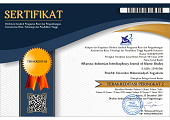Islamic Education in The Inclusive School: Experimental Study of The Application of Differentiated Instruction For Slow Learners
Abstract
One of competences that teachers need to achieve is readiness to teach students with various characteristics. Teachers of Islam religion subject in some schools do not have adequate competence to teach diverse students. Slow learners are mostly found in both regular and inclusive schools. The researchers offer a method which can adjust a curriculum to be compatible to students’ conditions namely differentiated instruction method or DI to be applied in Islam religion subject. The goal of this research serves to figure out whether or not DI method can improve learning motivation and achievement for slow learners. The research respondents were slow learners in regular schools. It applied pretest-posttest experiment research method. The research was conducted in April and May, 2019 in Primary School XX in Bantul regency. Data were collected using observation technique, pretest in the form of knowledge test covering previous theme namely sholat (praying) and posttest in the form of the result of knowledge test. Finding revealed that two out of three slow learners did not attend complete experiment process so that there was only one student left. There was a significant increase on knowledge score between pretest and posttest (sig 0,000). This student’s learning motivation improved as well from someone who was previously crying when being asked to come to the front of the class or to answer questions becoming a student who was more communicative.
Keywords
Full Text:
PDFReferences
Adams, N. (2015). Bloom's Taxonomy of Cognitive Learning Objectives. Journal of the Medical Library Assosiation, 152.
Aisah, A. (2018). Laporan Wawancara Tentang Inklusi di SD Tumbuh. Yogyakarta: Fakultas Agama Islam Universitas .
Amelia, W. (2016, Desember). Karakteristik dan Kesulitan Anak Belajar Slow Learner. Aisyah: Jurnal Ilmu Kesehatan, 1(2), 53-58.
Andini, D. W. (2016, Mei). Differentiated Instruction: Solusi Pembelajaran dalam Keberagaman Siswa di Kelas Inklusif. Trihayu: Jurnal Pendidikan ke-SDan, 2, 340-349.
Aziz, A. N., Sugiman, S., & Prabowo, A. (2016). Analisis Proses Pembelajaran Matematika pada Anak Berkebutuhan Khusus (ABK) Slow Learner di Kelas Inklusif. Kreano, Jurnal Matematika Kreatif-Inovatif, 111-120.
Cooter, K. S., & Cooter Jr, R. B. (2004). One Size doesnot fit all: Slow Learners in the rEADINGcLASSROOM. The Reading Teacher, 57-80.
D'Amico, & Kate, G. (2010). Differentiated Instruction for Middle School Science Teacher Activities and Strategies for Inclusive Classroom. San Fransisco: John Wiley & Sons, Inc.
Fitriyani, A. L. (2013). Efektifitas Remedial Teaching PAI dalam Meningkatkan Hasil Belajar Siswa: Studi Kuasi Eksperimen pada Bahasan Sholat untuk Siswa Kelas VIII di SMP Negeri 3 Lembang TA 2012/2013. Bandung: Fakulras Pendidikan Ilmu Sosial Universitas Pendidikan Indonesia.
Ghergut, A. (2011). Education of Chiildren With Special Needs in Romania; Attitudes and Experiences. Precedi-Social and Behavioral Sciences, 595-599.
Hall, T. (2002). Differentiated Instruction. Wakefield: MA Centre On.
Hallahan, D. P., & Kauffman, J. M. (1988). Exceptional Children: Introduction to Special Education. New Jersy: Prentice Hall, Inc.
Hanum, L. (2014, Desember ). Pembelajaran PAI Bagi Aanak Berkebutuhan Khusus. Jurnal Pendidikan Agama Islam, XI(2), 50-62.
Heacox, D. (2002). Differentiating Instruction in The Regular Classroom. USA: Free Spirit Publising.
Kementrian Kesehatan RI . (2014). Pusat Data dan Informasi Kementrian Kesehatana RI, Penyandang Disabilitas Pada Anak. Jakarta: Kemenkes.
Krishnakumar, P., Geeta, M., & Palat, R. (2006). Effectiveness of Individualized Education Program For Slow Learners. Indian Journal of Pediatrics, 73 (2), 135-137.
Latipun. (2011). Psikologi Eksperimen. Malang: Universitas Muhammadiyah Malang Press.
Lim, T. L., Shahrill, M., Mundia , L., Tengah, K. A., Tan, A., & Mahadi , M. A. (2016). An alternative approach to teaching: Implementing a cooperative learning strategy STAD at the junir college level. Advanced Science Letters, 1725-1729.
Muhaimin. (2005). Pengembangan Kurikulum Pendidikan Agama Islam di Sekolah, Madrasah dan Perguruan . Jakarta: Raja Grafindo Persada.
Nugrahayati, W., & Mustadi, A. (2019). Slow Learner Learning Facts in Their Inclusion Class. 6th International Conference on Educational Reserach and Innovation (ICERI 2018) (pp. 149-152). Atlantis Press.
Pramuji, E. (2015). Metode Pembelajaran PAI di SD Negeri Tanjung 1 Kecamatan Purwokerto Selatan Kabupaten Banyumas TA 2014/2015. Purwokerto: Program Studi PAI Fakultas Tarbiyah dan IlmuKeguruan IAIN Purwokerto.
Sebba, J., Byers, R., & Rose, R. (2019). Redefining The Whole Curriculum for Pupils with Learning Difficulties. London: Routledge, Taylor & Francis Group.
Silalahi, U. (2015). Metode Penelitian Sosial Kuantitatif. Bandung: Refika Aditama.
Tafsir. (2010). Filsafat Pendidikan Islami. Bandung: Remaja Rosdakarya.
Tomlinson, C. A., & McTighe, J. (2006). Integrated Differentiated Instruction and Understandingby Design. Alexander Virginia: Assosiation for Supervision and Curriculum Development.
Tomlinson, C. A., Brighton, C., Hertberg, H., Callahan, C. M., Moon, T. R., Brimijpon, K., et al. (2003). Differentiating Instruction in Response to Student Readiness, Interest and Learning Profile in Academically Diverse Classrooms. Journal for the Education of the Gifted, 119-105.
Vasudevan, A. (2017, Desember). Slow Learners-Causes, Problems and Educational Programmes. International Journal of Applied Research, 308-313.
Walgito, B. (2010). Pengantar Psikologi Umum. Yogyakarta: Penerbit Andi.
DOI: https://doi.org/10.18196/AIIJIS.2019.0106.281-301
Refbacks
- There are currently no refbacks.
Copyright (c) 2019 Afkaruna: Indonesian Interdisciplinary Journal of Islamic Studies

This work is licensed under a Creative Commons Attribution-ShareAlike 4.0 International License.
Afkaruna: Indonesian Interdiciplinary Journal of Islamic Studies indexed by:












1.png)


